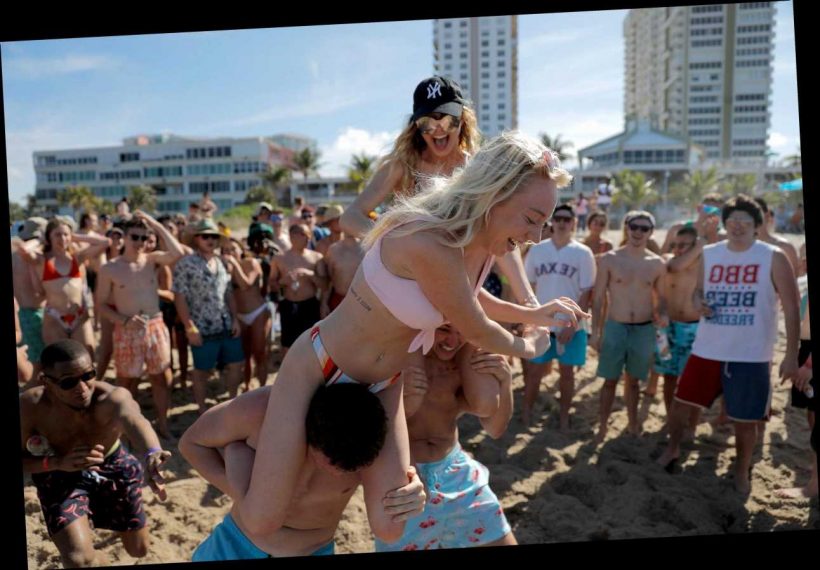COVID-19 vaccine distribution is ‘great news’ for travel and tourism: Marriott International CEO
Marriott International CEO Tony Capuano tells ‘Your World’ wider distribution of vaccines will ‘really drive confidence’ about the safety of travel.
Students at the University of California, Davis can earn a $75 grant if they agree to stay in town for spring break.
SPRING-BREAK PARTYING FALLS VICTIM TO COVID-19 CRISIS
According to a Facebook post from UC Davis, the Healthy Davis Together Spring Break Grants will be awarded to 500 applicants.
UC Davis spokesperson Melissa Blouin told FOX News that applications are being accepted through Wednesday, March 10, and that so far interest has been strong.
“The purpose of this $75 grant is to encourage UC Davis students not to travel during spring break and provide them with alternative activities to do during the week,” Blouin explained. “This is an opportunity for students to create a memorable experience for the people they live with or are connected to virtually.”
The grant options include the Get Active Grant, the Get Artsy Grant, the Home Improvement Grant, and the Let’s Stay In Grant. The grants must be redeemed at select Davis businesses during the university’s spring break from March 22-26. Students must provide proof of identification when redeeming the grant.
HEALTH EXPERTS WARN OF NEW CORONAVIRUS SPIKE AS STATES EASE RESTRICTIOS, SPRING BREAK TRAVEL SURGES
Grant applications can be accessed through UC Davis students’ Google accounts here.
Applicants must be currently registered UC Davis students living full-time in Davis, California and who are staying for the college’s spring break. In addition, applicants must have a COVID-19 test scheduled during spring break.
Meanwhile, those who choose to travel out of state will have to quarantine for 10 days after returning, per state guidelines. UC Davis recommends that students get tested every three to four days before and after their trip.
CLICK HERE TO GET THE FOX NEWS APP
The incentive from UC Davis comes as colleges around the U.S. are scaling back spring break or canceling it entirely to discourage partying that could spread the coronavirus and raise infection rates back on campus.
- Image 1 of 6
FILE – In this March 17, 2020, file photo, Cece Guida, 19, top, of New York City, pushes on Sam Reddick, 20, of Evansville, Ind., as spring break revelers look on during a game of chicken fight on the beach in Pompano Beach, Fla. Colleges around the U.S. are scaling back spring break or canceling it entirely to discourage beachfront partying that could raise infection rates back on campus. (AP Photo/Julio Cortez, File)
- Image 2 of 6
FILE – In this March 17, 2020, file photo, two men wrestle each other as spring break revelers look on during a contest on the beach in Pompano Beach, Fla. Colleges around the U.S. are scaling back spring break or canceling it entirely to discourage beachfront partying that could raise infection rates back on campus. (AP Photo/Julio Cortez, File)
- Image 3 of 6
FILE – In this March 17, 2020, file photo, group of spring break revelers pose for a photograph on the beach in Pompano Beach, Fla. Colleges around the U.S. are scaling back spring break or canceling it entirely to discourage beachfront partying that could raise infection rates back on campus. (AP Photo/Julio Cortez, File)
- Image 4 of 6
FILE – In this March 14, 2020, file photo, Tabatha Hannah, a student at St. Clair Community College, center, talks with Miami Beach police officers in Miami Beach, Fla. Colleges around the U.S. are scaling back spring break or canceling it entirely to discourage beachfront partying that could raise infection rates back on campus. (AP Photo/Lynne Sladky, File)
- Image 5 of 6
Josie Hornback, left, and Davis DeWitt, both students at the University of Louisville, spend time sitting in the sun on Clearwater Beach Tuesday, March 2, 2021, in Clearwater, Fla., a popular spring break destination, west of Tampa. Colleges around the U.S. are scaling back spring break or canceling it entirely to discourage beachfront partying that could raise infection rates back on campus. "I’m with people I know. I’m not an at-risk person," she said. (AP Photo/Chris O’Meara)
- Image 6 of 6
Beachgoers take advantage of the weather as they spend time on Clearwater Beach Tuesday, March 2, 2021, in Clearwater, Fla., a popular spring break destination, west of Tampa. Colleges around the U.S. are scaling back spring break or canceling it entirely to discourage beachfront partying that could raise infection rates back on campus. (AP Photo/Chris O’Meara)
Texas A&M University opted for a three-day weekend instead of a whole week off. The University of Alabama and the University of Wisconsin-Madison also did away with spring break but are giving students a day off later in the semester. The University of Mississippi, which canceled spring break, said it will end the semester a week early.
The United States has surpassed 29 million COVID-19 cases and 527,000 related deaths, according to the latest data from Johns Hopkins University. The Centers for Disease Control and Prevention reported that over 93.6 million COVID-19 vaccines have been adminstered in the United States as of Tuesday.
The Associated Press contributed to this report
Source: Read Full Article

